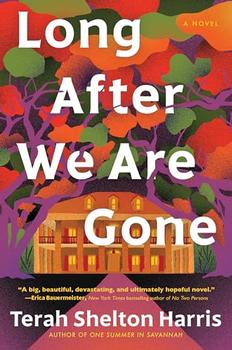Summary | Excerpt | Reading Guide | Discuss | Reviews | Beyond the Book | Readalikes | Genres & Themes | Author Bio

A Novel
by Terah Shelton Harris
Mance shuffles back across the yard and flicks his cigarette into the bin by the workshop door. They both smoke, but never inside, never around wood; smoke stained and infiltrated and compromised the integrity of it. Lou's excavator sits tucked on the side. They borrowed it one month ago from their neighbor to dig up a busted waterline, bartering its use for a custom fireplace mantle. The work of their hands, not the money in their pockets, paid for the extensive renovations and repairs on the Kingdom. But the job is done, waterline repaired, and mantle installed, and Mance wants the excavator gone, has wanted it off the property for weeks now. There it sits, as Lou's excuses for its removal pile up. Mance curses under his breath as he swings the barn door open.
Inside, Mance runs his hand along one of the finished, unpainted columns, his fingertips searching for cracks, imperfections, rough areas, and finding none, the column as smooth as his hands are rough, the column solid as he is tough. Architecture has always astounded him, how things are made, what holds them together. That a simple wooden column could be all that stands between an uneventful day and disaster. Mance moves to the next column and picks up a sheet of 200 grit sandpaper.
There's an art to sanding a piece of wood by hand—the right amount of pressure to apply, the rhythm of the strokes. Shh, shh. Shh, shh. Shh, shh. Back and forth. Side to side. Round and round. It's knowing when to stop sanding or when you've gone too far. He hears this rhythm in the quietude. Heard this rhythm in prison, alone in his cell for eighteen months and again for nine more months. Shh, shh. Shh, shh. Shh, shh. Both times it served as the silent melody that protected him and his mind from his surroundings. Shh, shh. Shh, shh.
Sound is everything.
And he wants it for his son.
Terrible thing to live in fear, and Mance forgets to be nervous. But when he thinks about Henry navigating the world in silence, his heart quickens—first with anxiety, then with something else. Something he doesn't have the words for yet.
So, he sands. He sands because he can't scream all the time. He sands because the truth won't stop hurting. He sands until the sandpaper tears and the pads of his calloused fingertips go numb, until wood dust floats in the air, until the sun creeps up on the entrance of the workshop.
Mance takes a break and lights another cigarette, leaning against the barn door, watching the way the morning light sets the Kingdom on fire. He loves this land because his father does. It provides a sense of belonging. The Solomons have lived on and farmed the two hundred acres of the Kingdom for the last two hundred and thirty years. He isn't from this land; he is of this land. King, Mance, and now Henry.
He flicks out his cigarette and sees the backhoe out of the corner of his eye. He will thump Lou's fuckin' skull the next time he sees him if that goddamn excavator isn't removed soon, he thinks, just as he sees King on the ground propped up by the excavator's track frame, his body angled back at the Kingdom, his eyes open wide, nearly without life now.
His hands are on his thighs, open, palms up.
Mance runs toward his father. As he falls down beside him, he hears him say in a shallow breath, his last, "Don't let the white man take the house."
Excerpted from Long After We Are Gone by Terah Shelton Harris. Copyright © 2024 by Terah Shelton Harris. Excerpted by permission of Sourcebooks Landmark. All rights reserved. No part of this excerpt may be reproduced or reprinted without permission in writing from the publisher.
Your guide toexceptional books
BookBrowse seeks out and recommends the best in contemporary fiction and nonfiction—books that not only engage and entertain but also deepen our understanding of ourselves and the world around us.